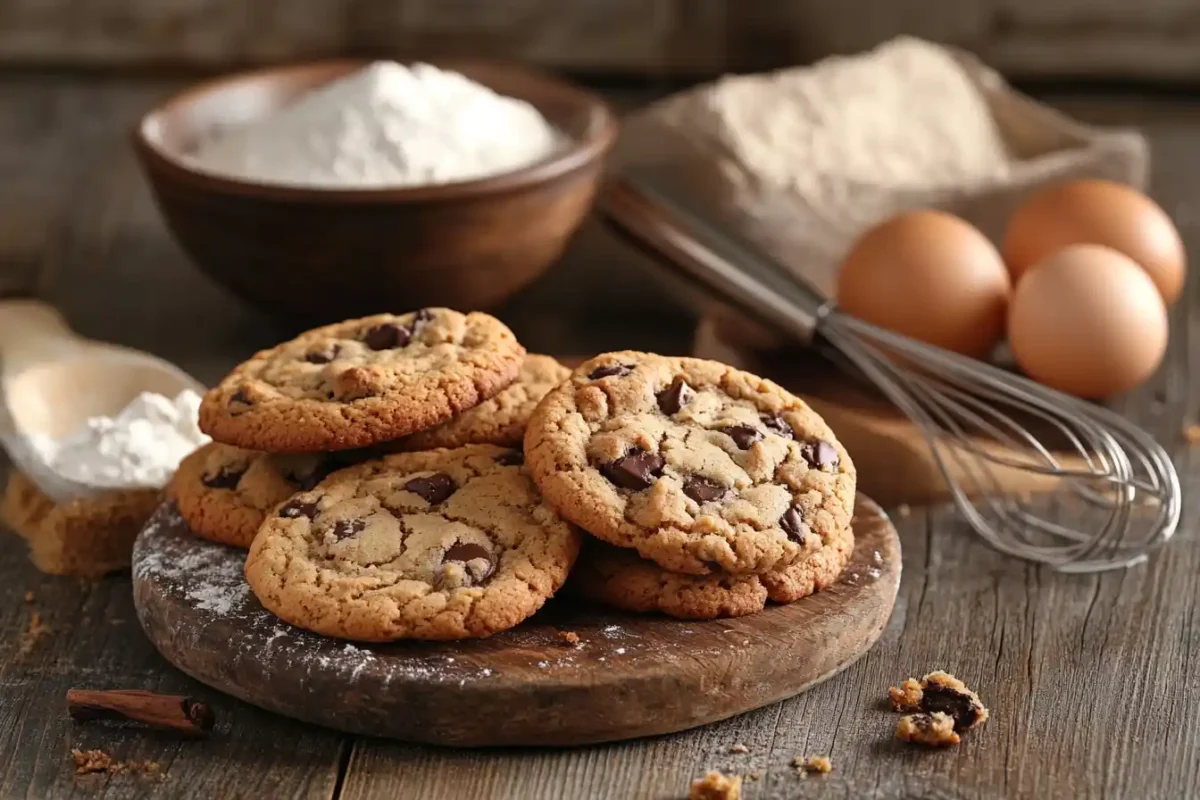Cookies are a beloved treat, but crafting the perfect batch often requires precision. One common tweak in cookie recipes involves adjusting the number of eggs. But what does adding an extra egg do to cookies? Whether you’re aiming for chewy, soft cookies or experimenting with flavor, understanding the science behind this tiny change can make all the difference. In this article, we’ll delve into how eggs shape cookie texture, flavor, and overall baking success. Let’s crack open the secrets to perfect cookies, starting with the basics.
What Does Adding an Extra Egg Do to Cookie Dough?
How Eggs Enhance Moisture and Structure in Cookies
Eggs are the unsung heroes of baking. They’re not just there to hold your cookie dough together; they’re integral to creating a harmonious balance of structure, moisture, and flavor. The proteins in eggs act as binders, ensuring all your ingredients form a cohesive dough. Without this binding, your cookies might crumble under pressure—literally.
Additionally, eggs introduce moisture retention, which keeps cookies soft and delectable. The water content in eggs hydrates the flour, ensuring the dough is pliable and bakes evenly.
The Difference Between Egg Yolks and Egg Whites in Baking
Ever wondered why some recipes call for just yolks or whites? It’s not random! Egg yolks are rich in fats, making them champions of texture enhancement. Adding yolks results in velvety, chewy cookies. On the other hand, egg whites, with their high protein and low-fat content, help create lift and structure. If you’re after airy, light cookies, whites are your go-to.
However, balance is key. Using only yolks or whites can alter the final product dramatically. A whole egg provides the best of both worlds, but experimenting with yolks or whites individually can yield fascinating results.
How Adding an Extra Egg Improves Cookie Texture
Softness and Chewiness: The Science Explained

Adding an extra egg to cookie dough can dramatically alter its texture. Eggs, particularly yolks, introduce extra fat, which promotes a softer and chewier bite. The proteins in egg whites, however, contribute structure, making cookies sturdy enough to hold their shape while baking. When you add an extra egg, you’re effectively increasing the dough’s hydration, which helps dissolve sugars and encourages gluten development. This can make cookies softer and denser, perfect for those who love a fudgy texture.
Interestingly, yolks add richness, creating a melt-in-your-mouth sensation. If you’re aiming for cookies with a moist center and a slightly crispy edge, experimenting with an extra yolk can be your secret weapon. Remember, though, balance is crucial to avoid overly cakey results.
Influence on Cookie Spread and Shape
Curious about how adding an extra egg affects the look of your cookies? Eggs impact the spread and thickness of your cookies in surprising ways. More egg whites often lead to taller, puffier cookies because they create more steam during baking. This steam helps the dough rise and sets the structure.
Conversely, the fat in egg yolks slows down the spreading process, meaning your cookies retain a thicker, chunkier shape. If you’re baking cookies with inclusions like chocolate chips or nuts, this can prevent them from flattening too much, keeping those delightful chunks evenly distributed.
For more tips on perfecting small-batch cookies, check out this guide to small-batch chocolate chip cookies.
The Flavor Implications of an Extra Egg
Does an Extra Egg Enhance Flavor?
It’s not just about texture—eggs play a vital role in flavor, too. When you add an extra egg, particularly the yolk, you enrich the cookie’s overall taste. Yolks are packed with fat and natural emulsifiers, which bind ingredients together and create a buttery, decadent profile. If your cookies often taste dry or bland, an extra yolk could be the missing piece to elevate their flavor.
That said, overdoing it can lead to an overly eggy taste. A single extra egg can work wonders, but balance it with other flavor-enhancing ingredients like vanilla extract or brown sugar to keep everything harmonious.
Avoiding Overpowering Eggy Flavors
Too much egg can overpower the nuanced flavors of other ingredients. To strike the right balance, consider how eggs interact with sugar and butter, which are also key flavor contributors. For cookies that are rich but not cloying, use slightly less butter when adding an extra egg. This ensures the flavor is rounded without becoming overwhelming.
For more insights into balancing flavors, visit this guide on perfecting cookie flavor profiles.
Practical Tips for Adjusting Recipes
When to Add an Extra Egg to Your Recipe
Adding an extra egg to cookie dough isn’t a one-size-fits-all solution. The decision often depends on the type of cookie you’re making and the result you’re aiming for. If you notice your cookies are crumbly or lack cohesion, an extra egg can act as a binding agent to fix the issue. Similarly, for recipes with a higher proportion of dry ingredients like oats or cocoa powder, an extra egg helps maintain moisture, resulting in softer cookies.
To achieve cookies that are extra chewy and moist, consider adding an additional yolk instead of a whole egg. This approach increases fat content without making the dough overly wet, striking the perfect balance.
Customizing for Desired Texture
Whether you’re baking crispy or chewy cookies, understanding how eggs influence texture is key. For thinner, crispier cookies, reduce the number of eggs and increase the sugar or butter content. For thick, soft cookies, go ahead and add that extra egg. Adjusting other ingredients like flour and leavening agents ensures the dough remains balanced and bakes evenly.
If you’re curious about mastering texture in cookies, don’t miss this guide on small-batch chocolate chip cookies, which offers detailed tips for experimenting with small batches.
Part 5: Common Missteps When Adding Eggs (300 Words)
Overmixing and Its Consequences
One of the most common mistakes when adding an extra egg is overmixing the dough. Eggs contain proteins that, when mixed excessively, can develop gluten in the flour. This results in tough, dense cookies rather than the soft, chewy treats you intended. To avoid this, mix the dough just until the ingredients are combined. This preserves the tender crumb that makes cookies so irresistible.
Overmixing can also trap too much air in the dough, causing cookies to rise unevenly and collapse during baking. Gentle mixing ensures your cookies maintain their structure.
Balancing Wet and Dry Ingredients
Another pitfall is failing to adjust other ingredients when adding an extra egg. Too much liquid can throw off the dough’s consistency, leading to cookies that spread too much or don’t bake evenly. To counteract this, increase the amount of flour slightly or chill the dough before baking. This allows the fat to solidify, helping the cookies hold their shape.
For more troubleshooting tips and baking hacks, check out other helpful articles on the website, such as the strawberry shortcake recipe for more inspiration.
Benefits of Adjusting Eggs for Dietary Preferences
Customizing Recipes for Egg-Free Baking
Not everyone can or wants to use eggs in their cookies. Luckily, there are several ways to adapt recipes while still achieving a delicious result. If you’re wondering what does adding an extra egg do to cookies and how to replicate its effects without eggs, substitutes like flaxseed meal, chia seeds, or applesauce are great options. These alternatives add moisture and act as binders, much like eggs.
However, each substitute affects the texture differently. Flaxseed meal and chia seeds create a denser cookie, while applesauce adds a softer, cake-like quality. Experiment with small batches to find the substitute that works best for your recipe.
Adjusting for Lower Cholesterol Options
If you’re looking to lower the cholesterol in your cookies, using just the egg whites or substituting a whole egg with a cholesterol-free egg replacer is a practical solution. Egg whites provide structure and lift but lack the richness of yolks. To compensate, increase the butter or sugar slightly to maintain flavor balance.
For more insights into creating customized cookie recipes, explore other tips on diet-friendly cookie modifications.
Using Eggs to Enhance Seasonal Cookies
Adding Extra Eggs to Festive Recipes

Seasonal cookies, like gingerbread or pumpkin spice cookies, often benefit from the addition of an extra egg. These recipes typically include spices or purees that can dry out the dough. Adding an egg boosts moisture and helps the cookies bake evenly.
For example, pumpkin spice cookies with an extra egg are softer and less prone to cracking. The egg’s binding properties ensure the spices are evenly distributed, making each bite flavorful and cohesive.
Creative Flavors With Extra Eggs
Adding an Extra Egg to Enhance Holiday Ingredients
When crafting holiday treats, consider how an extra egg can improve other ingredients’ incorporation. From citrus zest in sugar cookies to dried fruits in oatmeal cookies, the additional moisture ensures even mixing and prevents dry, crumbly cookies.
Moisture Balance for Unique Festive Recipes
The extra egg not only binds ingredients but also helps retain moisture, creating soft, flavorful cookies perfect for seasonal celebrations.
FAQs on Adding Extra Eggs to Cookies
Why Do Some Recipes Call for an Extra Egg?
Many cookie recipes include an extra egg to adjust the texture and consistency. But what does adding an extra egg do to cookies? Simply put, it enhances moisture, acting as a binding agent that holds the ingredients together. This is especially useful for recipes with dry ingredients like cocoa powder or oats, which can absorb significant liquid during baking.
Adding an extra egg also contributes to richer flavor and denser cookies. If your cookies tend to crumble or seem too flat, an extra egg might be the fix you need.
How Do Eggs Affect Chocolate Chip Cookies?
Chocolate chip cookies are a classic example of how eggs influence baking. By adding an extra egg, you create a dough that is easier to work with and results in cookies that are soft and chewy. The yolk adds richness, while the whites promote structure and lift, ensuring that your cookies hold their shape without being too stiff.
If you’re experimenting with different chocolate chip cookie variations, try tweaking the egg quantity slightly. This small change can make a noticeable difference in the final texture and flavor.
What Happens if You Add Two Extra Eggs?
While adding one extra egg often improves cookies, adding two might be overkill. Too many eggs can make the dough overly wet and lead to spreading during baking. The cookies may also taste overly eggy, masking the flavors of sugar, butter, and chocolate. Stick to one extra egg unless the recipe specifically calls for more.
Experimenting with Cookie Recipes at Home
Simple Ways to Test Egg Adjustments
Experimenting with egg quantities is a fun way to customize your cookies. To see the effects firsthand, divide your dough into two batches. Add an extra egg to one and bake both. Compare the textures, noting differences in softness, chewiness, and flavor.
Another easy experiment involves adding just an extra yolk to one batch. This will showcase how fat influences texture and flavor.
Documenting Results for Consistency
When experimenting, keep detailed notes on your adjustments. Record the number of eggs used, any changes to other ingredients, and the results. This documentation ensures that once you find your ideal recipe, you can replicate it every time.
For more inspiration on customizing recipes, explore related content on cookie-baking techniques and other creative ideas.
Conclusion:
Understanding what adding an extra egg do to cookies opens up a world of baking possibilities. Eggs are not just a basic ingredient; they are the backbone of cookie texture, flavor, and structure. Adding an extra egg can transform your cookies from flat and brittle to soft, chewy, and flavorful. However, the key is balance—adjusting other ingredients to maintain the perfect dough consistency.

Experimenting with egg quantities is a simple yet impactful way to refine your recipes and tailor them to your preferences. Whether you’re making classic chocolate chip cookies or exploring new flavors, the knowledge of how eggs influence your bake gives you creative control in the kitchen.
So, the next time you’re baking, consider the humble egg as your secret weapon. With a little trial and error, you’ll be baking cookies that are not just delicious but perfectly suited to your taste! Happy baking! 🍪

